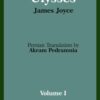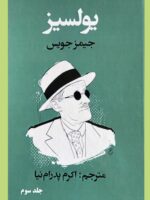یولسیز (جلد یکم)
چرا یولسیز؟ چرا باید تا این اندازه اهمیت بدهیم به یک روز (۱۶ ژوئن ۱۹۰۴) از زندگی مردی سیوهشت ساله، کارگر آگهیهای روزنامهها، یهودی تغییرمذهبداده، و زن بیوفا و درماندهاش و جوان بیست و دوسالهی افسرده، رهایییافته از مذهب کاتولیک که دلش میخواهد او را نویسندهای برجسته و سرشناس بدانند، گرچه جز مشتی مطالب عجیب چیزی ننوشته است؟ چرا باید رمانی را با بیشمار ارجاع و اشارههای پنهان و عبارتها و جملههای بغرنج بخوانیم؟ اصلاً چرا باید یولسیز را تبلور رمان مدرن بدانیم؟
بیشک ما رمان میخوانیم چون رمان را انسانها مینویسند دربارهی انسانها و برای انسانها. یولسیز هم از این مقوله بیرون نیست و علاوه بر شخصیتپردازی منحصر بهفرد، بازیهای زبانی و بهکارگیری فرم و تکنیکهای ادبی نو و ویژه مثل تکنیک سیال ذهن و تکگویی درونی، تکنیک چندصدایی یا بیشمارصدایی، چرخشهای طبیعی و دقیق راوی، از فنون و نوآوریهای خاص نثر و سبک نگارش برخوردار است.
مثلاً هر فصل، سبک و شیوهی روایت متفاوتی با فصول دیگر دارد. فصل سه عمدتاً در قالب درونتکگویی روایت میشود. فصل هفت، که بخش عمدهاش در دفتر روزنامه میگذرد، سرشار از آرایهها و نمایههای سخندانی و سخنوری است. شیوهی روایت فصل یازده، با استفاده از نامآواها، تکرار و تجانس آوایی، نوعی تقلید از موسیقی است. فصل دوازده داستانی است با گسستهای عجیب و افراطی. فصل سیزده مانند رمان عاشقانه روایت میشود. فصل چهارده روند تکامل نثر انگلیسی را از آغاز تا قرن نوزدهم بازتولید میکند. فصل پانزده در قالب نمایشنامه تعریف میشود. فصل هفده پرسش و پاسخ است، و همهی اینها در فصل آخر به اوج و کمال میرسد. این فصل در هشت پاراگرافِ بلند، بدون علائم سجاوندی و در قالب درونتکگویی مالی، یکی از شخصیتهای اصلی داستان، تعریف میشود. برخی قسمتها چنان فشرده و سنگین است که بهآسانی نمیتوان به درکی کامل از آن رسید. کتاب سرشار است از ارجاعات به متون کلاسیک، فلسفهی ارسطو، آثار قرون وسطی و دانته، و مملو است از زبان کوچه و بازار شهر دابلن.
(برگرفته از سایت ناشر)
Ulysses has been labeled dirty, blasphemous, and unreadable. In a famous 1933 court decision, Judge John M. Woolsey declared it an emetic book–although he found it sufficiently unobscene to allow its importation into the United States–and Virginia Woolf was moved to decry James Joyce’s ”cloacal obsession.” None of these adjectives, however, do the slightest justice to the novel. To this day it remains the modernist masterpiece, in which the author takes both Celtic lyricism and vulgarity to splendid extremes. It is funny, sorrowful, and even (in a close-focus sort of way) suspenseful. And despite the exegetical industry that has sprung up in the last 75 years, Ulysses is also a compulsively readable book. Even the verbal vaudeville of the final chapters can be navigated with relative ease, as long as you’re willing to be buffeted, tickled, challenged, and (occasionally) vexed by Joyce’s sheer command of the English language.
Among other things, a novel is simply a long story, and the first question about any story is: What happens?. In the case of Ulysses, the answer might be Everything. William Blake, one of literature’s sublime myopics, saw the universe in a grain of sand. Joyce saw it in Dublin, Ireland, on June 16, 1904, a day distinguished by its utter normality. Two characters, Stephen Dedalus and Leopold Bloom, go about their separate business, crossing paths with a gallery of indelible Dubliners. We watch them teach, eat, stroll the streets, argue, and (in Bloom’s case) masturbate. And thanks to the book’s stream-of-consciousness technique–which suggests no mere stream but an impossibly deep, swift-running river–we’re privy to their thoughts, emotions, and memories. The result? Almost every variety of human experience is crammed into the accordian folds of a single day, which makes Ulysses not just an experimental work but the very last word in realism.
Both characters add their glorious intonations to the music of Joyce’s prose. Dedalus’s accent–that of a freelance aesthetician, who dabbles here and there in what we might call Early Yeats Lite–will be familiar to readers of Portrait of an Artist As a Young Man. But Bloom’s wistful sensualism (and naive curiosity) is something else entirely. Seen through his eyes, a rundown corner of a Dublin graveyard is a figure for hope and hopelessness, mortality and dogged survival: ”Mr Bloom walked unheeded along his grove by saddened angels, crosses, broken pillars, family vaults, stone hopes praying with upcast eyes, old Ireland’s hearts and hands. More sensible to spend the money on some charity for the living. Pray for the repose of the soul of. Does anybody really?”
(From: Amazon)











There are no reviews yet.